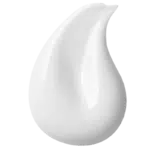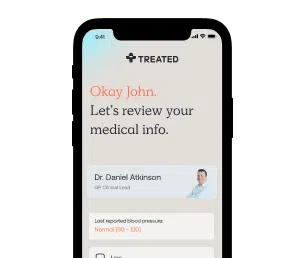Discoid eczema
Treatments for circular patches of itchy, cracked skin.
Secure delivery
UK clinicians
Discoid eczema is a long-term skin condition that causes circular patches of cracked, swollen skin to appear on your body. The affected areas can sometimes become infected.
Start a free consultation and get tailored recommendations with your health needs in mind. Order discoid eczema treatments online, and get practical advice from medical experts.
Discoid eczema, sometimes referred to as discoid and nummular dermatitis, is a skin condition that causes circular or oval patches of swollen, cracked skin. They usually start as smaller spots or bumps, and can appear almost anywhere on your body.
The patches can range in size, and can be anywhere from a few millimetres up to several centimetres. They can cause severe itchiness, typically in the evening, and over time the patches can change appearance. At first, the affected areas are red or pink (or dark brown on darker skin), but over time they can become swollen, and might form a blister that contains fluid.
Discoid eczema can sometimes get infected. You should keep an eye on any affected areas that feel hot, swollen, or develop a yellow crust.
Discoid eczema can occur at any age. It’s rare in children, and is instead more likely to affect adults. Those who get discoid eczema often have other types of eczema at the same time, like atopic eczema or contact dermatitis.
Men who are aged between 50-70 are more commonly affected, as are teenage women and women in their twenties.
It’s tricky to say just exactly how common discoid eczema is. It’s seen mostly in middle-aged adults, although it’s not fully understood why.
The most commonly affected parts of the body are the lower extremities (from your hips to your toes), arms and hands but discoid eczema patches can form nearly anywhere on the body. They don’t usually appear on the face or the scalp, though.
Discoid eczema has been associated with alcoholism, so you might be prone to developing it if you drink more than the recommended amount of units per week. It can also be drug-induced, so it’s worth checking if any medications you use might be having an effect.

How we source info.
When we present you with stats, data, opinion or a consensus, we’ll tell you where this came from. And we’ll only present data as clinically reliable if it’s come from a reputable source, such as a state or government-funded health body, a peer-reviewed medical journal, or a recognised analytics or data body. Read more in our editorial policy.
It’s not known why people develop discoid eczema. It’s thought that it has to do with the skin being dry, which then causes it to become aggravated.
When skin becomes dry, it loses its natural protective barrier. Without this barrier, it becomes more prone to irritation from the chemicals found in everyday toiletries and cosmetic products.
Often, people who have discoid eczema have atopic eczema, so it’s worth checking if any undiagnosed allergies are behind your symptoms. Unlike atopic eczema, discoid dermatitis doesn’t run in families.
Discoid eczema usually begins as small bumps or spots that show up on your skin, which then become larger, red-or-pink patches. Typically, several patches will start to appear, and they can range in size from a few millimetres to around two or three centimetres. They are often circular, or oval ‘discoid’ shapes, and can be asymmetrical (uneven).
The affected patches are usually swollen, and covered in tiny fluid-filled blisters. They often cause itching which is worse in the evening. The longer you have discoid eczema, the more the patches can develop and become dry and flakey. And if the blisters break, the patches can become infected.
Discoid eczema won’t develop into a more serious condition, but symptoms might bother you long-term if you don’t get them under control.
The patches of swollen and cracked skin on your body are also at risk of becoming infected the longer you leave them. Infection can also occur as the result of constant scratching, so getting the right help as soon as your symptoms develop will save you a lot of discomfort in the long run.

How we source info.
When we present you with stats, data, opinion or a consensus, we’ll tell you where this came from. And we’ll only present data as clinically reliable if it’s come from a reputable source, such as a state or government-funded health body, a peer-reviewed medical journal, or a recognised analytics or data body. Read more in our editorial policy.
The type of medication you’ll be recommended will usually depend on the severity of your symptoms. There are several ways of treating discoid eczema, and it might be suggested you use more than one treatment at the same time.
Emollients like Dermol and Doublebase might be suitable for dry, flakey skin, and are an effective way of replenishing lost moisture on your skin’s surface. Epaderm ointment and Hydromol work in a similar way, and the latter can even be used as a soap substitute.
Topical corticosteroids are commonly prescribed to treat eczema-related conditions, and might be recommended for your discoid dermatitis. Betnovate, Mometasone and Dermovate all work in a similar way — they contain steroids that have anti-inflammatory qualities and help to suppress your normal immune response. They can be applied directly to your skin.
Antihistamines might be recommended as an add-on treatment to help with itching. They might be particularly useful if you have seasonal allergies that worsen your eczema.
You may also be prescribed an immunosuppressant like tacrolimus (also found in Protopic) if corticosteroids haven’t worked well for you, or if you’ve experienced adverse reactions to them. These medications work by modulating your immune responses to treat and prevent eczema flare-ups.
You might find that moisturisers and creams available in supermarkets and pharmacies help with your discoid eczema. Some pharmacy-strength medications contain active ingredients and are designed to soothe irritated, inflamed skin. You can begin using them once you’ve had a chat with a pharmacist.
Avoiding soaps and laundry detergents that irritate your skin can allow it to heal faster, and applying creams and emollients straight after showering or having a bath can ease your symptoms. If you think your itchy skin is made worse by allergies, common antihistamines might help.
If a clinician thinks your discoid eczema will respond better to a topical corticosteroid, or if your skin is infected and requires antibiotic treatment, you’ll usually need a prescription.
Eventually, discoid eczema might clear up without needing treatment. It can take a long time though, and without managing it properly, the condition can come back.
Because the circular patches of red skin are often cracked and itchy, it might be hard to avoid scratching them. This can make the rash worse, and can cause the patches to become infected. This is another reason why it’s important to get the right help — a clinician can help you get on top of your condition, and they’ll help you choose a treatment that can restore your skin to its natural state as soon as possible.

How we source info.
When we present you with stats, data, opinion or a consensus, we’ll tell you where this came from. And we’ll only present data as clinically reliable if it’s come from a reputable source, such as a state or government-funded health body, a peer-reviewed medical journal, or a recognised analytics or data body. Read more in our editorial policy.
Have something specific you want to know? Search our info below, or ask our experts a question if you can’t find what you’re looking for.
Nummular Dermatitis. [online] PubMed.
Discoid eczema symptoms and treatments.

Lowers inflammation to treat eczema symptoms. The generic version of Protopic.
Helps reduce swelling, redness and itching. Generic version of Elocon.

Registered with GMC (No. 4624794)
Meet Daniel
Registered with GPhC (No. 2202465)
Meet Sanjeda
Registered with GPhC (No. 2070724)
Meet Craig
Always read the leaflet that comes with your medication and tell us about any side effects you get.
We know health, but you know you.
Our experts tell you what’s safe, but you decide what’s best.
Answer a few questions and tell us about yourself. Get tailored advice from our clinicians so you can choose better.

Choose your treatment and how often you have it delivered.

We know things change. It’s the nature of life. We’ll check in regularly to make sure your treatment is still right for you.
Pause. Change. Skip. Start again. Any time you like.
Here are some other things we can help with.
Choose from our range of tablets and solutions. Get ongoing care and support from our experts.
Stop smoking treatments that can help you kick the habit forever, and reduce your risk of disease.
Tablets or injections. Tailored weight loss treatments combined with ongoing support from our experts.
We're making healthcare more about you. Sign up to our newsletter for personalised health articles that make a difference.
Disclaimer: The information provided on this page is not a substitute for professional medical advice, diagnosis, or treatment. If you have any questions or concerns about your health, please talk to a doctor.
We couldn't find what you're looking for.
Here's everything we treat. Or, if you're looking for something we don't have yet, you can suggest something.
If there’s a particular treatment or condition you’re looking for, tell us and we’ll look into it for you.
Submit your question here, or tell us if you’ve found an issue on our site.
We’ll get back to you very soon. We aim to respond to all queries in one working day.
You’re signed up to our newsletter. Keep an eye on your inbox for our latest update.
By clicking 'Subscribe now' you're agreeing to our Privacy Policy.
We’ve sent you an email asking you to confirm your email address.